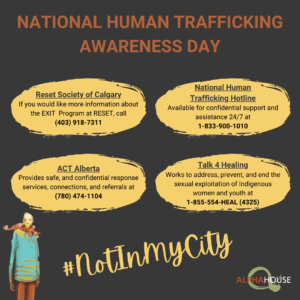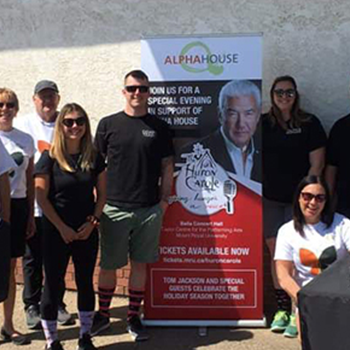Sex and labour trafficking are the two dominant forms of human trafficking in Canada
February 22, 2023 | In The News News
National Human Trafficking Awareness Day
February 22nd marks Canada’s third National Human Trafficking Awareness Day. First observed in 2021, the Canadian government officially declared the 22nd of February a national awareness day as part of their commitment to not just raise awareness, but promote understanding and inspire Canadians to address the ongoing issue of human trafficking.
As a Human Services agency committed to supporting the safety and well-being of vulnerable individuals, Alpha House acknowledges the devastating impact that human trafficking inflicts on individuals and their families, and stands behind the organizations working towards the changes needed to end human trafficking in Canada.
Human Trafficking
Human Trafficking can take many forms, but typically includes a complex series of crimes over an extended period of time and involves the recruitment, transportation, and holding of people for the purposes of sexual or labour exploitation in a form of modern-day slavery. This can occur through various means including false promises of employment, fraud, debt bondage, kidnapping, and physical coercion. In some cases, traffickers may use violence, forced use of drugs or the threat of harm to individuals and their loved ones in order to maintain absolute control over their victims.
Use of force and the threat of harm offers traffickers the freedom of hiding victims in plain sight, often making instances of its occurrence difficult to identify. An example of this may be someone coercing a woman into sexual labour through threats of violence, or traffickers taking advantage of unstable situations in someone’s home country to coerce individuals into undesirable acts/situations. At Alpha House, we work with individuals who have been in both situations.
The personal stories of clients supported through Alpha House’s programs, particularly some of the women and immigrants we work with, serve as devastating reminders about the consequences of human trafficking and the prevalence of it in our society still today. While it is possible for any individual to become a victim of human trafficking, national and global data shows us that women, members of minority groups, those experiencing housing insecurity/homelessness, those with substance addictions and/or mental health disorders, or survivors of past traumas are at a heightened risk of victimization not just due to the instability of their situations, but also the lack of familial, social, and legal supports that vulnerable individuals often experience.
Victims of human trafficking may experience significant physical and psychological trauma, displacement from their homes, as well as the loss of freedom, dignity and control over their lives. Trafficking often leads to long-term challenges with psychological and emotional health, including depression, anxiety disorders, PTSD, substance use and disorders, shame and guilt, alienation and isolation from social supports, suicidal ideation, and identity disturbance/confusion.[1] These situations, unfortunately, are scenarios that have been experienced all too commonly by clients supported by Alpha House and are just some of the many reasons why raising awareness on this topic is of particular significance to our agency.
Signs of Human Trafficking
Part of awareness includes understanding the signs of a potential human trafficking situation. The signs that somebody may be a victim of trafficking can include:
- Physical signs of abuse or neglect, such as bruises, scars or malnourishment
- Lack of control over identification documents, such as a passport or ID
- Isolation and limited contact with friends or family members
- Living and working in conditions of extreme squalor, with little or no payment
- Limited knowledge of their location, as victims are often moved frequently to avoid detection
- Inability to leave their work or living situation due to physical force or other forms of coercion
- Lack of access to medical care
It’s important to remember that not all victims of trafficking show all of these signs, so if something feels off, please seek advice from law enforcement or an appropriate organization.Top of Form
Available Resources
If you notice a situation where you believe human trafficking is taking place, or are a victim in need of support, here’s who to call:
- Your local authorities – in Calgary, police non-emergency can be reached at (403) 266-1234 or for immediate assistance, call 911.
- The National Human Trafficking Hotline is available for confidential support and assistance 24 hours a day, 7 days a week by calling 1-833-900-1010 or online at https://www.canadianhumantraffickinghotline.ca/
- Reset Society of Calgary – if you are experiencing sexual exploitation and would like information about the EXIT Program at RESET, call (403) 918-7311 to connect.
- Talk 4 Healing works to address, prevent, and end the sexual exploitation of Indigenous women and youth. Call 1-855-554-HEAL (4325)
- Action Coalition on Human Trafficking (ACT Alberta) provides free, safe, and confidential response services, connections, and referrals for victims of human trafficking. Please call (780) 474-1104 to connect.
Combatting Human Trafficking
The Canadian government has taken several steps to combat human trafficking. To read more about what’s being done, please follow the links:
- Criminalization of human trafficking through the Criminal Code of Canada
- Establishing the Royal Canadian Mounted Police (RCMP) National Strategy to Combat Human Trafficking
- Developing the National Action Plan to Combat Human Trafficking
- Providing funding and support to organizations that provide services to survivors of human trafficking
- Improving border security measures to prevent cross-border trafficking
- Raising awareness about human trafficking through the sharing of public education campaigns and outreach initiatives like Human Trafficking Awareness Day
[1] Psychological Effects of Human Trafficking: Depression, Anxiety & Substance Use [Part 1] (growfreetn.org)

